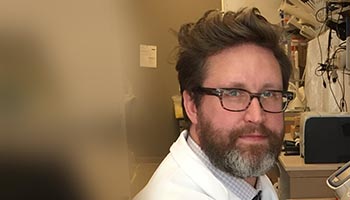HOW CAN WE HELP YOU? Call 1-800-TRY-CHOP
In This Section
Early Career Physician Scientist Wins Award to Advance Rare Lung Disease Research

David B. Frank, MD, PhD, is unraveling the mechanisms leading to rare fetal lung lesions.
georges [at] email.chop.edu (By Sharlene George)
Congenital pulmonary airway malformations (CPAMs) start out as a group of cells during fetal development that are supposed to grow into healthy lung tissue. In these rare cases, the cells instead form abnormal cystic structures that do not function properly and interfere with babies’ normal breathing. Researchers are unsure why that cellular growth goes awry and the airway does not form properly.
David B. Frank, MD, PhD, a pediatric cardiologist at Children’s Hospital of Philadelphia and assistant professor of Pediatrics at the Perelman School of Medicine at the University of Pennsylvania, is unraveling the mechanisms leading to fetal lung lesions with the support of a Doris Duke Charitable Foundation 2020 Clinical Scientist Development Award that also will help build CHOP’s biorepository of lung specimens.

David B. Frank, MD, PhD, pediatric cardiologist at Children’s Hospital of Philadelphia.
Dr. Frank consults most often with families who have children experiencing pulmonary hypertension and right heart failure from a variety of causes, including CPAMs. Pulmonary high blood pressure is related to lesions such as CPAMs because they take up growth of normal lung vasculature.
“If we can find ways to inhibit the growth of the lesions, we can promote the growth of healthy pulmonary vasculature and prevent pulmonary hypertension, not only in this disease, but possibly in other diseases where the pulmonary vasculature is not well developed,” Dr. Frank said.
While CPAMs are an uncommon condition overall — the incidence is reported as one in 7,200 live births — an experienced team at CHOP diagnoses and cares for about 30 babies each year with fetal lung masses. Several types of CPAMs occur, and some can be “massive” that require surgical removal or cyst drainage during pregnancy or after delivery, Dr. Frank explained. Families can donate the lung tissue from those surgeries and biopsies to CHOP’s biorepository of lung specimens as a vital platform to advance pediatric lung disease research.
The idea behind Dr. Frank’s study is to populate this repository with more samples and generate genomics and transcriptomics data to fully characterize CPAMs at the single cell level and potentially find signaling pathways that may inhibit these lesions’ growth or cause them to go away. He is collaborating with the Center for Applied Genomics at CHOP to perform the single-cell RNA sequencing. So far, they’ve collected over 130 lesion samples.
Another unique part of the grant is an ex vivo, three-dimensional lung organoid model to study CPAMs’ growth that Dr. Frank established while working as a postdoctoral fellow in the lab of Edward E. Morrisey, PhD, a professor of Cell and Developmental Biology at the Perelman School of Medicine at the University of Pennsylvania. Scientists know that abnormal epithelial cells drive CPAM lesions. Dr. Frank will use the 3-D matrix to resemble CPAM cystic structures and potentially find signaling pathways or something that is abnormally present in CPAM epithelium compared to normal tissue. He will leverage this knowledge to identify targets for future drug therapies to impede CPAM development and possibly open opportunities for more individualized treatment.
“If we have a child who undergoes lung tissue removal, we can take that tissue, grow it in the cell culture in the ex vivo organoid, do sequencing, and hopefully someday produce personalized medicine to treat their rare lung lesion,” Dr. Frank said.
Dr. Frank envisions the “Unraveling Heterogeneity and Novel Therapies for Rare Pediatric Lung Disease” project supported by the Doris Duke award as a stepping stone to look at other rare pediatric lung diseases that are not uncommon at CHOP, such interstitial lung disease, alveolar capillary dysplasia, and chronic lung disease related to prematurity.
“CHOP is a unique institution,” Dr. Frank said. “We have a wonderful fetal and pediatric surgical program that is a major referral center for children across the world. It gives us significant access to tissue and clinical data on a lot of these rare pediatric lung diseases. We can combine this knowledge to advance research more quickly and contribute more brainpower to think of new ways to treat these diseases. It is a pretty collaborative effort going on right now.”
Dr. Frank recognized CHOP colleagues William Peranteau, MD, an attending surgeon in the Division of General, Thoracic, and Fetal Surgery, and Lisa Young, MD, chief of the Division of Pulmonary Medicine, and the Doris Duke Charitable Foundation for their support of the lung tissue biorepository’s advancement and the talented researchers at CHOP devoted to high-risk, high-reward research.
Dr. Frank is one of 17 physician scientists who each received a 2020 Clinical Scientist Development Award of $495,000 over three years. A panel of distinguished experts in the medical field chose these early career physician scientists from a pool of 208 applicants through a thorough, multistage review process. The award funds physician scientists who are at the early stages of their profession to help them transition to independent research careers.